Going back to Dragon Age: Origins today for what was far from my first playthrough, I realised it’s never really had a true sequel (or if maybe that’s a little harsh for some: it’s never had a sequel that followed it’s classic RPG spirit in quite the same way). Yes, the world of Thedas has been further explored by Hawke and The Inquisitor – with Rook soon to be added to the list of overworked protagonists with a mate called Varric – but it’s never felt like the spirit of Origin’s Dungeons and Dragons-inspired design has ever truly been iterated on within the franchise. While lore has been fleshed out and new stories have irrevocably changed Thedas’ future (and everybody’s opinion on Anders and explosives), the core gameplay of Dragon Age has moved on from intricate tactical positioning and D&D-lite roleplaying to a sense of more ‘current’ combat and exploration – or at least what seemed like it was current, in the games of its time.
Dragon Age 2 for instance was a limited character study by necessity, thanks to its incredibly tight turnaround time (16 months!), replacing the multitude of unvoiced dialogue options in Origins with a more limited, yet voiced, Mass Effect-style dialogue wheel – a staple of all BioWare games now. Then Dragon Age: Inquisition gave in to the flavour of the decade, in the wake of The Elder Scrolls 5: Skyrim’s vast success, and went full on open world, with materials to pick up every three steps, a ping button to spam, and so much bloat that the much-maligned Hinterlands starting area became one of the series’ biggest jokes. Official social media accounts even had to remind players that there was a whole game waiting for them beyond its boundaries.
Even with the big differences between all of the games though, Origins stands out. Not only did it lay down the foundation of all the series’ gloriously in-depth lore – from complicated religions and warring countries, to the fascinating and dangerous dreamworld of the Fade – it’s also a deeply nerdy take on fantasy within video games. It’s shown in touches like the intricate tactics system that allows for control of your party right down to the minutiae of how and when companions can perform any action, but also in the huge range of dialogue options that let you be just as heroic, evil, or awkwardly forward as you like.
The game’s title, Origins, is another indicator here: that this game places its focus on how you want to build your character above all. You’re not Hawke; you’re not The Inquisitor; you’re whoever you want to be in the world of Thedas, with a backstory not summed up on a character creator screen but instead actually experienced first-hand, before you’re given the title of Grey Warden. You’re the important one here, not your moniker. Are you a Dalish Elf reluctant to leave your nomadic lifestyle behind, or are you a poor city Elf thankful to be rid of the poverty in Denerim’s alienage? A mage kept in the isolated tower of The Circle about to endure their dangerous Harrowing initiation, or a Dwarf unable to use magic? Common, or noble?
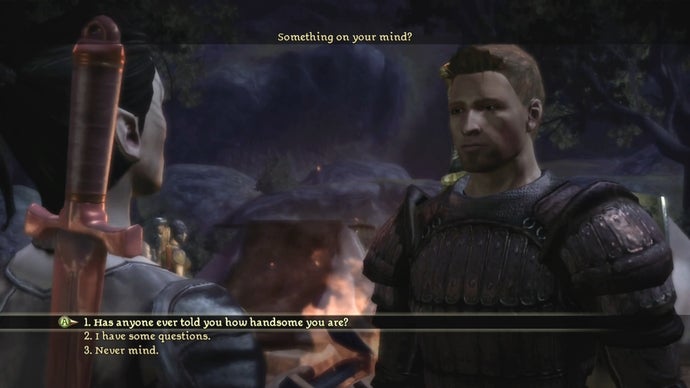
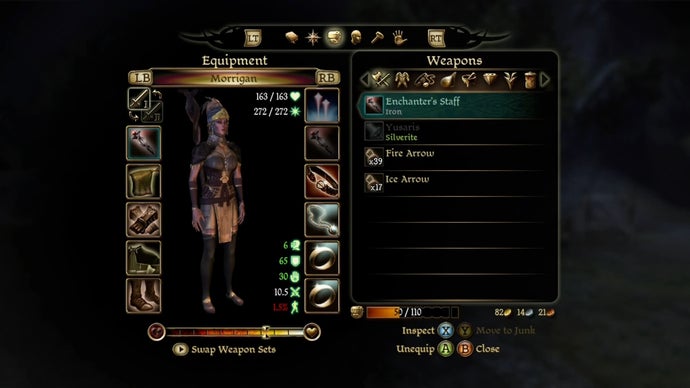
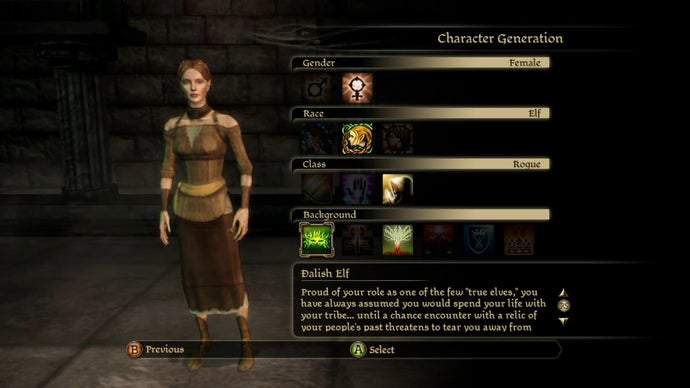
These race and background choices can drastically alter the ending, romance options, and ways the world reacts to you, but also, crucially, how you react to the world. I’m not usually someone who thinks too deeply about my RPG protagonists’ pasts, but there’s something about the partially filled-in blank slate Origins starts you off with that gives me a gentle push to join in on the roleplay. I made a Dalish Elf in my most recent jaunt through Ferelden’s Blight-infested landmarks, and right from the start decided to only pick dialogue options that I thought she would pick. Namely: cautious to the point of rudeness when it comes to humans, asking about their Chantry religion while I was already fully aware of its bloody backstory, while also humouring demons who I know to have duplicitous intentions.
I also waited longer to romance everybody’s favourite, smart-mouthed royal bastard, Alistair. My Dalish ingénue surely wouldn’t start flirting with a man she just met! And so that embarrassingly awkward cutscene of us barely touching loincloths would have to wait until my character felt more comfortable around human folk. (Really, I’m not sure she would ever feel fully into it with the dog constantly barking in the background and a metre of space between her and the apparent love of her life as they marvel at each other’s polygons, but there’s only so far you can take the bit.)
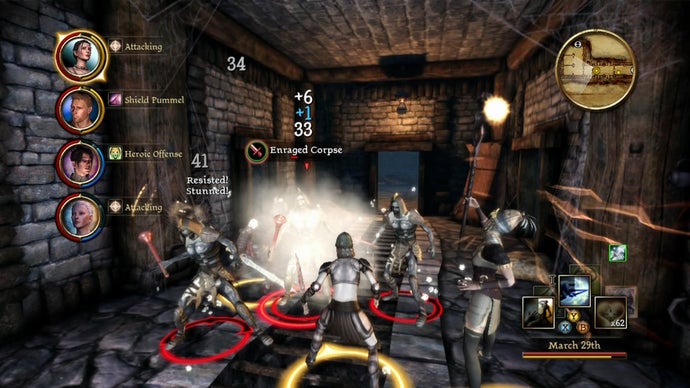
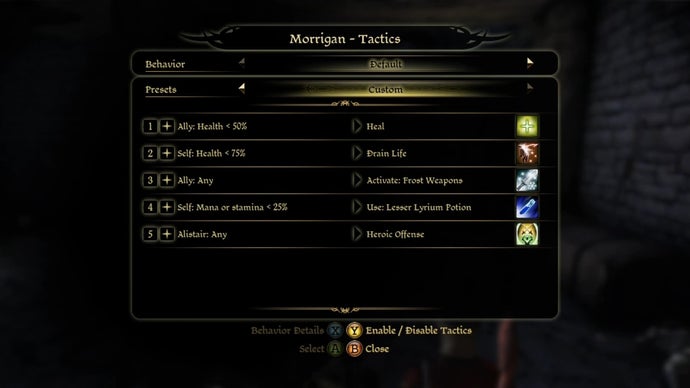
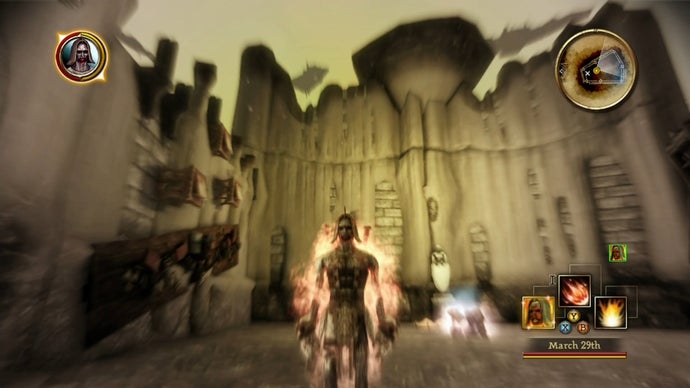
It’s not just me that feels the pull of playing along either. Somewhere between pretending to ignore Alistair and deciding whether or not to slaughter the poor, potentially possessed mages at The Circle, I forgot the consequences of downing a mysterious alchemical vial during the Warden’s Keep DLC. On a quest for answers I discovered a Reddit thread that quickly and dismissively answered the question as to what it did, with the rest of the comments made up of chatter about the reasons each person’s Warden did or didn’t take the potion. (The trade-off is extra abilities versus some dodgy manufacturing ethics, for those curious. Turns out blood magic and torture is a tough sell.)
The roleplaying may have its limits, but 15 years later, Origins still stands up as a valiant attempt at providing an Xbox 360-era bridge to the almost limitless possibilities of Dungeon and Dragons. The issue is, as such a good bridge – and as a game resembling the older school of RPG design – it’s easy to be frustrated at the broader, more action-focused route Dragon Age took in the years since. But here’s the thing: it’s harder to be upset that the series went in a more real-time, action-focused cinematic route in its sequels now, when the phenomenon that is Baldur’s Gate 3 exists.
If Origins is a D&D middle ground, Baldur’s Gate 3 is, as we know all too well, just about as close to experiencing a campaign of Dungeons and Dragons as a video game can get. Origins encourages you to roleplay, but in Baldur’s Gate 3, it’s almost impossible not to.
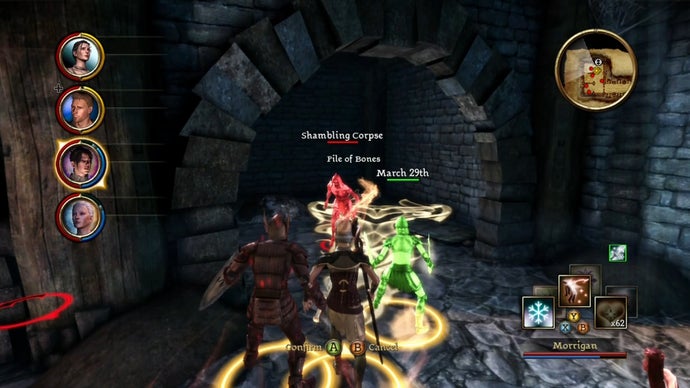
It has its own limitations, of course, but it doesn’t feel that way the majority of the time because of the staggering variety of choice available in almost every situation. To an old Dragon Age: Origins player this is the dream. Stacking boxes to reach an area is just as viable of an infiltration technique as turning into a mouse to sneak through a hole, or teleporting over an obstacle with Misty Step. Companions and important NPCs can die. You can miss entire plotlines if you venture too far into the story. And your race and character class options are as vast as the unique combat, exploration, and dialogue options developer Larian gives you. Even the appeal of the slow-paced, classic CRPG combat comes from the game’s huge variety of available options.
Baldur’s Gate 3 also – just as I’d always wanted from Dragon Age – lets you delve deeper into the psyche of your flawed party, which can lead to a romance with any one of them. United not in the task of saving the world, but selfishing trying to get rid of their mind flayer parasites, your companions’ interactions with each other are on a whole different level, where hostility between them can even lead to their deaths if you’re not careful. Though loincloths and ten second clips of staring at your scene partner are replaced here with those now-infamous sex scenes that would make HBO blush.
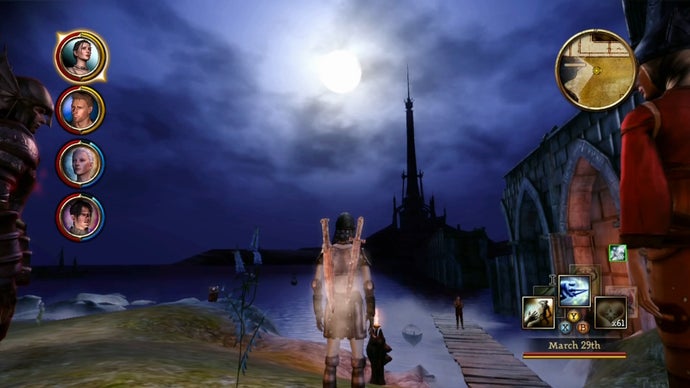
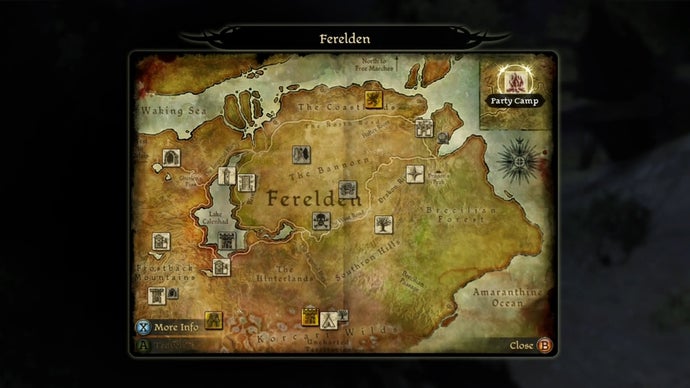
Bladur’s Gate 3 feels, in other words, a lot like Dragon Age: Origins, all grown up. I can’t help but appreciate the D&D influence coming full circle. Just as Origins was BioWare’s spiritual successor to its classic Baldur’s Gate games, Baldur’s Gate 3 feels an awful lot like the spiritual successor to Dragon Age: Origins. Or at least the natural evolution of what the Dragon Age series could have been, if it had leaned into its dorkier, old-school CRPG side. Baldur’s Gate 3 even picks up where BioWare left off with that structuring of smaller, more focused band of companions that the Dragon Age developer brought in with Mass Effect and Dragon Age 2.
None of this, of course, is to say Dragon Age 2 and Inquisition are bad – they just have very different design philosophies. Nor do I think that Origins isn’t still welcoming to series newcomers, now that Baldur’s Gate 3 is here to steal your time. Instead, while it may be the Darkspawn-tainted nostalgia speaking, the point is I reckon there’s still a place for Origins’ D&D-lite design today – perhaps, in a post-Baldur’s Gate 3 world, even more so now than there was in 2009. Origins may not have as many paralysing choices and deep consequences as Baldur’s Gate 3, but I think that’s its main appeal, outside of geeking out to Dragon Age lore. It feels like kicking off a game of Dungeons & Dragons, only this time with a pre-made character sheet and starting pack – an experience intricate enough to craft something that feels unique to you, but not far enough out there to manipulate the whole world, past a few set choices. A comforting compromise – that middle ground – when compared to the sometimes overwhelming depth of some contemporaries today. It’s been a joy to go back to it – and Dragon Age: The Veilguard will hopefully be a joy in its own regard, and its own style, when it brings another new spin of its own soon enough.
